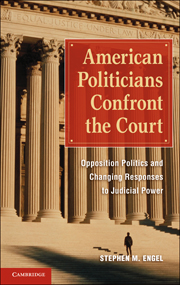 American Politicians Confront the Court
American Politicians Confront the Court Book contents
- Frontmatter
- Contents
- Acknowledgments
- Introduction
- PART I POLITICAL DEVELOPMENT AND ELECTED-BRANCH RELATIONS WITH THE JUDICIARY
- PART II HOSTILITY TO JUDICIAL AUTHORITY AND THE POLITICAL IDIOM OF CIVIC REPUBLICANISM
- PART III HARNESSING JUDICIAL POWER AND THE POLITICAL IDIOM OF LIBERAL PLURALISM
- On the Return of Opposition Illegitimacy and the Prospects for New Development
- Index
- References
Introduction
Had Americans “Stopped Understanding about the Three Branches”?
Published online by Cambridge University Press: 05 June 2012
- Frontmatter
- Contents
- Acknowledgments
- Introduction
- PART I POLITICAL DEVELOPMENT AND ELECTED-BRANCH RELATIONS WITH THE JUDICIARY
- PART II HOSTILITY TO JUDICIAL AUTHORITY AND THE POLITICAL IDIOM OF CIVIC REPUBLICANISM
- PART III HARNESSING JUDICIAL POWER AND THE POLITICAL IDIOM OF LIBERAL PLURALISM
- On the Return of Opposition Illegitimacy and the Prospects for New Development
- Index
- References
Summary
On 3 March 2009, former Justice Sandra Day O'Connor, as a guest on The Daily Show with Jon Stewart, voiced concerns about a perceived rising tide of anti-judicial hostilities:
What I became aware of increasingly in those last years [since my retirement] was all the criticism of judges across America. We heard a lot from Congress and in state legislatures, we heard a lot about activist judges, didn't we – secular godless humanists trying to tell us all what to do – I mean that was what we were hearing. And I just didn't see it that way. And, I thought perhaps a lot of Americans had stopped understanding about the three branches of government.
That O'Connor, a Reagan appointee, would warn against this antagonism is notable. For, while hostilities toward judges and courts have, over time, known no particular partisan color, during the 1990s and early 2000s such anger was voiced primarily by a conservative insurgency that made inroads to power with Ronald Reagan in 1980. Around that time, Republican national platforms began to give vent to anti-judge tirades. Republican members of Congress have since followed with court-curbing bills, and a conservative legal movement has developed, making its judicial preferences widely known. By 1996, some congressional Republicans contemplated impeaching federal judges. These threats escalated when some called for impeaching Reagan-appointed Justice Anthony Kennedy.
- Type
- Chapter
- Information
- American Politicians Confront the CourtOpposition Politics and Changing Responses to Judicial Power, pp. 1 - 16Publisher: Cambridge University PressPrint publication year: 2011
References
- 1
- Cited by


